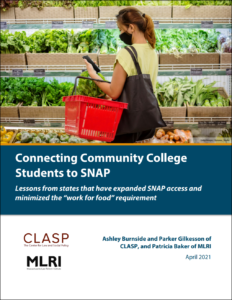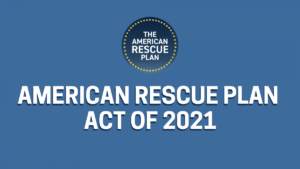Valuing Legal Services for People in Poverty
At the end of May, the Biden/Harris administration released its budget for FY22. Continuing the theme that emerged with the American Rescue Plan that President Biden signed in March and the American Jobs Plan and American Families Plan legislation he introduced in April, the new budget highlights the ways that the new administration is working to ease the burden of poverty on some of the country’s most vulnerable communities.
It’s a significant change in tone, not only from the administration immediately prior to this one but to several previous presidential administrations. It’s been decades since a U.S. President has focused on strengthening our nation’s social safety net, rather than weakening it thread by thread. And for those of us who have been on the front lines of advocating for laws and policies that help people living in poverty, rather than hurting them, it’s refreshing.
We thought we’d focus on one aspect of the President’s budget because it symbolizes this important sea change: its support of legal services and civil legal aid.
New Report Recommends Pathways to Reduce Food Insecurity Among Community College Students
 Food insecurity is on the rise throughout the country, including for low-income college students struggling to complete their education. COVID has further exacerbated the crisis for students. In a national survey conducted in the fall of 2020, roughly three in five college students reported they are experiencing basic needs insecurity during the public health crisis.
Food insecurity is on the rise throughout the country, including for low-income college students struggling to complete their education. COVID has further exacerbated the crisis for students. In a national survey conducted in the fall of 2020, roughly three in five college students reported they are experiencing basic needs insecurity during the public health crisis.
College students have been left with unique and complicated challenges as a result of the pandemic. At the colleges that previously offered campus-based food pantries, donated “meal swipes” from paid meal plans, or subsidized cafeteria meals, remote learning has caused these options to mostly disappear — and for many students, even these gestures were not enough. Community college students — a group often including more first-generation college students from families with low income — have been especially impacted without the campus and community networks that provided them with resources prior to the public health crisis.
Yet policy barriers in the Supplemental Nutrition Assistance Program (SNAP), including student work requirements known as “work for food” rules, perpetuate this threat to student learning, health, and stability.
Although Congress authorized states to implement temporary measures to provide federal nutrition benefits or SNAP to more college students during the pandemic, these measures will likely expire by end of this calendar year. But Massachusetts has demonstrated a solution that other states could emulate to more permanently expand access to SNAP benefits for low-income community college students.
First Circuit Stands up for Racial Equity and Diversity in Public Education

In the same week that US News & World Report solidified Boston Latin School’s educational prowess by ranking it Massachusetts’ number one public school and in the top fifty in the nation, the First Circuit opened access to the highly coveted exam school to students across the city, across racial lines, and across socioeconomic status. Last Wednesday, the appeals court denied the emergency injunction requests by the plaintiffs in the Boston Parent Coalition for Academic Excellence Corp. vs. Boston Public Schools Committee case thereby allowing Boston Public Schools to send out invitations to the exam schools using their temporary Covid-19 admissions plan.
The court gave a green light to admissions policies that address inequities and promote diversity.
MLRI Statement Regarding Verdict in the Trial of Derek Chauvin
The outcome of the Derek Chauvin trial – guilty on all counts – brings some measure of justice to the family of George Floyd, and relief to the community in Minneapolis, to Black and brown communities across the nation, and to all people of conscience.
The Massachusetts Law Reform Institute applauds the state prosecutors for making a strong case and the jury for their verdict. But the truth is that George Floyd should be alive today. His life mattered, he mattered. His agonizing death was the outcome of systemic racism in our nation that has devalued the humanity of Black people for 400 years. The Massachusetts Law Reform Institute pledges to continue our work to combat racism and injustice and to ensure that our Commonwealth and our nation treats Black and brown people with dignity, and that as a society we promote equity along with justice.
In solidarity,
Georgia Katsoulomitis, Executive Director
Virginia Benzan, Director, MLRI Racial Equity & Justice Project
MLRI Applauds the American Rescue Plan Act
 Last month, President Biden signed the $1.9 Trillion American Rescue Plan Act. The law will not only provide much-needed support to the American people as we all continue to manage hardships related to the COVID-19 pandemic, it will also lead to a substantial reduction in poverty in this country.
Last month, President Biden signed the $1.9 Trillion American Rescue Plan Act. The law will not only provide much-needed support to the American people as we all continue to manage hardships related to the COVID-19 pandemic, it will also lead to a substantial reduction in poverty in this country.
The American Rescue Plan Act recognizes a fundamental reality – this pandemic has been particularly difficult on already vulnerable individuals and families. People living in poverty, Black and Brown communities, and immigrant families all have suffered disproportionately from COVID-19. The rescue plan means more resources and opportunities for those communities, which will in turn mean better public health and economic outcomes for all of us – because we are one society, one economy – and collective success and opportunity benefits everyone.
In particular, the new law – which was introduced by President Biden on the first day he assumed the Presidency and finally passed by the U.S. House of Representatives and the U.S. Senate in March – will have a tremendously positive impact on child poverty in this country.
Welcome!
Welcome to MLRI’s new blog.
We plan to use this platform to share MLRI news, helpful information on our initiatives, and perspectives on important topics related to poverty law. 2020 was one of the most difficult years in all of our memories. At the same time, the COVID-19 pandemic and the protests highlighting the importance of racial equity could not have made it clearer that the work we do is important to helping people living in poverty, Black and Brown communities, and other vulnerable residents.
MLRI has been a nationally recognized poverty law and policy center for more than five decades. We work together with advocacy and community partners to protect the rights of low income individuals and families. Throughout the last 50 years, we’ve had hundreds of victories — large and small — and led groundbreaking initiatives that have benefitted low-income people in Massachusetts.
We are working on a number of initiatives related to housing protections, racial equity, immigrants’ rights, food insecurity, and many more. We plan to use this blog to inform you of our work and update you on our progress.
Thank you for your interest in our work and we look forward to sharing more with you in the weeks and months to come.
